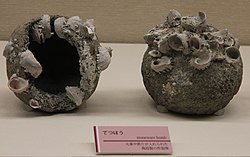Bomb
A bomb is an explosive object that makes and lets out its energy very quickly. This detonation makes a big shock wave. Bombs have been used for centuries. Some bombs also throw out dangerous metal fragments, and some are firebombs.
Most bombs do not contain more energy than ordinary fuel, except in the case of a nuclear weapon. However, they release their energy more quickly, thus are more powerful.
A bomb is usually some kind of container filled with explosive material that is designed to destroy things. The word bomb comes from the Greek word βόμβος (bombas), an onomatopoeic term with almost the same meaning as "boom" in English.
Air forces send bombers to destroy enemy targets. Terrorists use bombs in suicide attacks. Explosive materials used in mining work the same way, but are usually not called bombs.
Bomb Media
A "wind-and-dust" bomb depicted in the Ming Dynasty book Huolongjing. The pot contains a tube of gunpowder, and was thrown at invaders.
Thunder crash bombs from the Mongol invasions of Japan (13th century) that were excavated from a shipwreck near the Liancourt Rocks
An illustration of a fragmentation bomb from the 14th century Ming Dynasty text Huolongjing. The black dots represent iron pellets.
Diagram of a simple time bomb in the form of a pipe bomb
An American B61 nuclear bomb on its loading carriage
Unexploded unguided aerial bomb with contact fuse used by the Portuguese Air Force, Guinea-Bissau War of Independence, March 1974.
A B-2 Spirit drops forty-seven 500 lb (230 kg) class Mark 82 bombs (little more than half a B-2's maximum total ordnance payload) in a 1994 live fire exercise in California
A United States National Guard soldier firing a 40 mm grenade from an M320 grenade launcher





